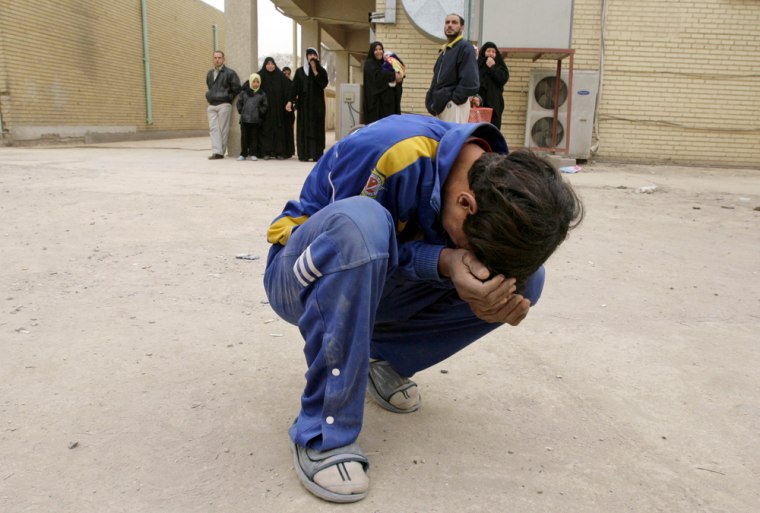As many as 15 Iraqi policemen responding to an attack against U.S. bases in Baghdad were killed and 27 wounded when rockets set to be launched exploded before they could be defused, officials said.
Four U.S. soldiers were wounded when the initial rockets slammed into their outposts in the capital, the military said.
It was the second rocket attack against U.S. targets in as many days.
Nobody claimed responsibility for the attacks, but in both cases the rockets apparently were launched from Shiite militia strongholds in the capital, raising concern about renewed activity ahead of a deadline for the anti-U.S. cleric Muqtada al-Sadr to renew a cease-fire order. Iraq
The U.S. military has expressed hope the radical cleric will extend the cease-fire but insisted on continuing to target what it says are Iranian-backed breakaway factions in raids that have alienated his followers.
The American outposts that were hit were close to each other and the attacks occurred within a five-minute timespan, according to Sgt. Nicole Dykstra, a military spokeswoman. One soldier was wounded in the first attack, while three were wounded in the second strike before Iraqi police responded, she said.
The blast that killed the Iraqis occurred after police, acting on a tip, discovered the rockets primed for firing in the back of a truck behind a deserted ice factory in the predominantly Shiite area of Obeidi in eastern Baghdad.
Explosives experts were trying to defuse the rockets when two of them detonated in quick succession, police said, adding that two rockets already had been fired from the truck.
At least 15 policemen were killed and 27 were wounded in the blast, according to officials with the Interior Ministry, local police and hospitals that received the wounded who spoke on condition of anonymity because they weren't authorized to release the information.
The U.S. military gave a lower casualty toll, saying three civilians were killed and 17 wounded in the truck explosion.
Most intense of attacks
The attack occurred a day after rockets slammed into an Iraqi housing complex near the Baghdad international airport and a nearby U.S. military base on Monday, killing at least five people and wounding 16, including two U.S. soldiers, officials said.
American troops arrested six Iraqi suspects in the vicinity of the apparent launching sites, the military said.
Police said those rockets were launched from the predominantly Shiite neighborhood of Amil, in southwestern Baghdad.
The attacks were among the most intense to strike the capital in weeks as violence has declined sharply with an influx of some 30,000 U.S. troops, a Sunni revolt against al-Qaida in Iraq and al-Sadr's cease-fire.
The cleric ordered his Mahdi Army militia last August to stand down for six months, but he recently warned that he may not extend the cease-fire if raids against his supporters persist.
A case to test militant crackdown
A trial against two former Health Ministry officials linked to the Mahdi Army also has raised concern that it could create a backlash from the Sadrists.
Prosecution witnesses failed to appear Tuesday for the politically fraught trial of the two men, who are accused of letting Shiite death squads use hospitals and ambulances to kill and kidnap rivals, delaying the start of the case to March 2.
Former Deputy Health Minister Hakim al-Zamili and Brig. Gen. Hameed al-Shimmari are accused of using their positions to help the Mahdi Army, a militia loyal to anti-U.S. cleric Muqtada al-Sadr carry out sectarian killing sprees.
The defense team has said the allegations are baseless, and planned to call more than a dozen witnesses.
The case is seen as a test of Prime Minister Nouri al-Maliki's willingness to crack down on Shiite extremists as well as Sunni insurgents. Al-Maliki is a Shiite, who won office partly because of the support of al-Sadr's followers, though he has since fallen out of favor among them.
After al-Zamili's arrest, the U.S. military said — without mentioning his name — that he was believed to have siphoned millions of dollars from the ministry to the Mahdi Army "to support sectarian attacks and violence targeting Iraqi citizens."
Militiamen also were allowed to use government hospitals and clinics to gather information on Iraqis seeking treatment and "those Iraqis that were discovered to be Sunnis would later be targeted for attacks," the military said. Ambulances also were allegedly employed to transport and kidnap victims.
Abdul-Sattar Bayrkdar, a spokesman for the Iraqi Higher Judicial Council, said the court could depend on witness testimonies available in investigation documents if the witnesses do not come to the next trial session on March 2.
Al-Zamili and al-Shimmari, who ran security for the ministry, are expected to face numerous charges, possibly including murder and kidnapping. U.S. soldiers stormed the officials' offices in separate raids last February.
Defense lawyer Amir Taha complained Tuesday that he was deprived of the right to meet his clients.
"They did not allow me to meet them until now," he said. "I submitted five letters to meet them but they were postponed on the pretext of technical reasons."
Abu Firas al-Mutairi, a second defense lawyer and member of the Sadrist movement, said the trial would be a "political one taking the cover of criminal case."
